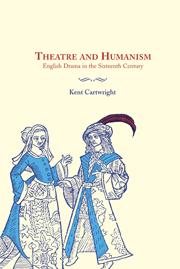Book contents
- Frontmatter
- Contents
- Acknowledgments
- Introduction
- 1 The humanism of acting: John Heywood's The Foure PP
- 2 Wit and Science and the dramaturgy of learning
- 3 Playing against type: Gammer Gurton's Needle
- 4 Time, tyranny, and suspense in political drama of the 1560s
- 5 Humanism and the dramatizing of women
- 6 The confusions of Gallathea: John Lyly as popular dramatist
- 7 Bearing witness to Tamburlaine, Part 1
- 8 Robert Green's Friar Bacon and Friar Bungay: the commonwealth of the present moment
- Afterword
- Notes
- Index
8 - Robert Green's Friar Bacon and Friar Bungay: the commonwealth of the present moment
Published online by Cambridge University Press: 22 September 2009
- Frontmatter
- Contents
- Acknowledgments
- Introduction
- 1 The humanism of acting: John Heywood's The Foure PP
- 2 Wit and Science and the dramaturgy of learning
- 3 Playing against type: Gammer Gurton's Needle
- 4 Time, tyranny, and suspense in political drama of the 1560s
- 5 Humanism and the dramatizing of women
- 6 The confusions of Gallathea: John Lyly as popular dramatist
- 7 Bearing witness to Tamburlaine, Part 1
- 8 Robert Green's Friar Bacon and Friar Bungay: the commonwealth of the present moment
- Afterword
- Notes
- Index
Summary
Although Robert Greene is often derided as a theatrical hack and pastiche-maker, his Friar Bacon and Friar Bungay (c. 1589) demonstrates how commercial drama in the late 1580s could exploit humanist techniques of imitation, allusion, and analogy to attract repeat playgoers to an emergent fixed-venue theatre. Based on a prose romance, Greene's play recalls, imitates, and parodies contemporary plays, including those of Lyly and Marlowe; the earlier moralities and stage romances; his own previous dramas; and other literary and historical sources. The play's own characters and events mirror each other, too, so that actions resonate with multiple meanings; conversely, the heroine, Margaret, is developed in contrast to the literary metaphors and allusions that first define her. Such techniques help to cultivate a new public audience unified by a shared theatrical culture, so that commercial theatre now profits from humanist method. By affirming a knowledge accessible comparatively and theatrically, furthermore, Friar Bacon and Friar Bungay suggests the limits of academic knowledge – and thus offers a critique of the humanist dream of learning. In Greene's play, the troubled relationship between experience and knowledge that pulses through sixteenth-century drama achieves poignant culmination.
In the late 1580s, conditions at the playhouses were dynamic. The advent of permanent venues meant that producers needed to attract repeat customers. Competition with other entertainments, such as bearbaiting, demanded that drama provide immediate stimulation and variety. In this fluid period the repertory acting system became temporarily unstable, as several adult companies “reshuffled membership.”
- Type
- Chapter
- Information
- Theatre and HumanismEnglish Drama in the Sixteenth Century, pp. 222 - 246Publisher: Cambridge University PressPrint publication year: 1999



